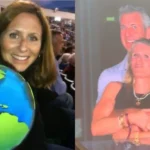- Birth date: The 18th day of february, 1934
- Died At Age: 58
- Sun Sign: Aquarius
- Also known as: Audre Geraldine Lorde
- Birthplace: Harlem, New York, United States
- The writer is well-known as a
- Ex-spouse/Partner: Edward Rollins
- Father: Frederick Byron Lorde
- mother: Linda Gertrude Bemar Lorde
- siblings: Helen, Phyllis
- children: Elizabeth Lorde-Rollins, Jonathon Rollins
- Died on: November 17, 1992
- the place for death Christiansted, U.S. Virgin Islands
- Remarkable Alumni Hunter College, National Autonomous University Of Mexico
- Reasons for Death Breast Cancer
- New York City Harlem, New York
- U.S. State: New Yorkers, African-American From New Yorkers
- Co-Founder/Founder: Kitchen Table: Women of Color Press
- Education: National Autonomous University of Mexico, Columbia University, Hunter College
- Awards award: 1981 Awards: 1981 American Book Awards- Lambda Literary Award for Lesbian Poetry
Was who is Audre Lorde?
Audre Lorde was a well-known Afro-American writer, educator as well as a feminist as well as a civil rights advocate. Born as a rebel, she did not have an ease at home and was constantly making friends with a small group of “outcasts” in school. Beginning to write poetry in her teens as she financed her college education by working odd jobs. Later, she became librarian. She enjoyed teaching as much as writing poetry and taught English at several universities. While teaching she wrote and published her first collection of poems at the age of 34 and soon after, other writers. She referred to herself as a “black woman, femme, lesbian poet, mother, and feminist” she also wrote prose, blasting at the injustices that were imposed to the oppressed. But, her anger never sparked violence. In her lifetime she had a profound impact on a lot of people, both males as well as women. A true warrior She never was one to quit, fighting for her rights until she died of stomach cancer at the ages of 58.
Image Credit
Early Childhood and Childhood
Audre Lorde was born on the 18th of February 1934, in Harlem, New York City. Born ‘Audrey”, she ditched the letter ‘y’ during her childhood as she thought it sounded more symmetrical. Audre Lorde, which both end with an ‘e’, would sound more and symmetrical. She also disliked the’y’ tail hanging off her name.
Their parents are of Afro-Caribbean origin. The father of her daughter, Frederick Byron Lorde, originally from Barbados was involved employed in the real estate sector. He was attractive and ambitious, but very distant towards his children.
Linda, her mother Belmar was originally from Grenada. Though she was of African-Caribbean origin she had a light skin tone and was frequently referred to as Spanish. She was also extremely rigid and Audre was a rebel from birth and did not have a great relationship with her.
Audre was the in the tiniest of the three children of her parents and had two elder sisters known as Phyllis along with Helen. Being born nearsighted until the point that she was legally blind and tongue tied that impeded her speech development. She was not closer to her sisters.
A unique child who was not able to speak until she reached the age of four years old. From the moment she began talking Linda taught her the alphabets, and soon she was able to write and read.
Since her early years, Audre loved poetries, studying them all. When she was asked an inquiry, she would choose something appropriate and recite it as her response. While at the same time, being adamant and angry with her sisters, she was extremely difficult to handle. The beatings did not make her more straight.
Audre started her schooling with St. Mark’s School and then at St. Catherine School. The atmosphere in these schools was so racial that the nuns deemed her braids, usually Afro-American unsuitable to the environment of their school. In reality, they discovered no problem with her hairstyle.
After finishing her primary education, she attended Hunter College High School for her second year of education. She made friends there with an irrational group who were introduced to Diane di Prima, a fellow student who was an aspiring poet.
Audre created her first poem in the eighth grade. In her senior year she was appointed editor of the school’s magazine. At the time she also joined the Harlem Writers’ Group, taking lessons about Africa from John Henrik Clark.
At the age 17 She wrote her first poem in the Seventeen Magazine. It was written to pay an ode to the first person she loved it was later found to be too sophisticated for the magazine of her school.
After graduating from high school, she enrolled in Hunter College with English literature and philosophy. She also supported her with odd jobs including ghost writers factory worker, social employee, technician for X-rays medical assistant, etc. Due to her many responsibilities the college took her many years to complete her bachelor’s degree.
She was a student for one year studying in the National University of Mexico. The time she spent at the university was extremely important to her, since it helped her affirm her identity as poet and lesbian.
After her return in New York, she rejoined Hunter College, earning her bachelor’s degree in 1959. At the time she made a living working as librarian. In addition the writer continued writing and also began to actively participate in the Greenwich Village’s gay community.
When she received her B.A. qualification, Audre Lorde entered Columbia University and earned her master’s degree from library science at the age of the year 1961. At the time she was able to support herself by working as a librarian in the Mount Vernon Public library, the position she held until her wedding in 1962.
Initial Career
Although Audre Lorde was writing poetry since she was of 15, her work as a poet started to flourish in the year 1962 when her work first was published in Langston’s ‘New Poetry of the Negroes’. Then she began to see her poems published in a number of literary magazines for black people as well as foreign anthologies.
When she was in 1965, she was a student at St. Clare’s School of Nursing as a librarian. She then moved on to becoming the head librarian of The Town School in the following year . She remained in the position until 1968. In the meantime, she continued to publish poems in various journals.
It was in 1967 that Diane di Prima, who had studied with her during her time at Hunt Collage High School, advised her to create an outline for her first book. It was entitled “The First Cities’, it was published by Poets Press in 1968. The same year, she was given the position as poet in residence at Tougaloo College.
It was Tougaloo College was a small historically black college located in Mississippi. Even though her job was only for six weeks she was ecstatically accepted the assignment, and traveled to the south of Mississippi to experience the deep south for the first time in her entire life. This is also the first time she has had a job as a teacher.
At Tougaloo the school, she experienced a diverse environment. The majority of pupils were of African descent. It was also the time when students of African descent became militant. In the midst of this she composed a number of poems that were published under the title ‘Cables of Rage’ in the year 1970.
The experiences she had in Tougaloo College also made her realise that teaching was a better job than librarianship. It was similar to writing poems, a method of self-expression.
Writing & Teaching
When she returned in New York, Audre Lorde was admitted to at the City University under the ‘Search for Education the Knowledge, Elevation and Education program, which is a pre-baccalaureate course designed for students who are disadvantaged. After teaching at the City University for a short time she was a teacher the course at Lehman College for a brief time.
In the year 1970, Lorde joined John Jay College of Criminal Justice, under City University New York, as a Professor of English. At this time she released a number of books, including the first one “From the Land in which Other People live’ (1973). In this book she shared African mythology in order to convey feminine ideas.
The year 1974 was the time she released “New York Head Museum and Shop’ an album of poems which has been described as her most innovative work. In this collection she guided readers on a visual trip of the city showing the poverty and neglect that plagues its residents.
She was born in 1976 and released “Coal” and “Between Ourselves’. “Coal,” her debut book released by an established publisher brought her to a larger public. Though the book included many previously published poems, it is distinct in that it reveals distinct layers of her personality; “black, lesbian, poet, mother, warrior.”
She was born in 1977 and was affiliated with Women’s Institute for Freedom of the Press. The same year, she underwent surgery since she was found to be suffering from breast cancer. In the following year, she was also required to undergo a mastectomy. She kept a meticulous record of her experiences and published it in “The Cancer Journal” in 1980.
In 1977, she delivered her speech to her participation in the Lesbian and Literature Panel of the Modern Language Association. The speech later became the very first chapter of “The cancer Journal’.
The year 1978 was the time she released two more books published “Hanging Fire” and “The Black Unicorn’. Of these, ‘The Black Unicorn’ is believed to be her most complicated work. In this book, Lorde introduces African myths to American readers, and based on her own experiences, which included her racial pride, her womanhood and motherhood, as well as spirituality.
The Cancer Journal, published in 1980 , was her first prose work. The novel confronted the Western concept of illness physical beauty, the fear of death , etc. The same year, she was also a participant in the UN World Women’s Conference in Copenhagen.
She joined Hunter College in 1981. was a part of Hunter College, occupying distinguished Thomas Hunter chair. In addition, she taught in the department of City University. The same year, she had one of her works, which was a major one, published , ‘Use of the Erotic: the power of the erotic’
In addition to writing and publish, she published “Zami A new Spelling of My Name’ released in 1983. The book was an autobiography, in which the author wrote about her experiences in the 1950s, describing it as “biomythography.”.
The year 1984 was the first time he got “Sister Outsider: Essays and Speeches in 1984. The collection, consisting of 15 speeches and essays dating between 1976 and 1984, is believed to be among her most important works of prose non-fiction that had an enormous influence on the evolution theory of women’s rights.
In 1984, after being invited from Dagmar Schultz Audre Lorde began a professorship as a visitor in the Free University of Berlin, Germany. The university was a place where she touched the lives of many men and women both white and colored and encouraged many to write. In the same year she was diagnosed with cancer of the liver.
Then Later
After being diagnosed with the liver tumor, Lorde moved to St. Croix in the U.S. Virgin Islands, making her residence at the Judith’s Fancy area. In this area, she began other treatments, disregarding the counsel of well-known cancer experts.
In the past, Lorde underwent an African Naming ceremony, assuming the African name of ‘Gamba Adesa which is a close embrace of her African identity. In a move closer to this Lorde compared her cancerous cells to white policemen of South Africa during an interview in this time.
Despite her ever-advancing disease, she refused give upand published “Our Dead Behind Us” in 1986, and ‘A Burst of Light in 1988. The last collection of her poetry called ‘The Marvelous Arithmetics Distance Poems 1987-1992’ was published in 1993 posthumously.
In 1990, with her co-author Gloria I. Joseph, she co-authored ‘Hell under God’s Command’. They also established several groups that are located in St. Crux such as the Che Lumumba School for Truth and the Women’s Coalition of St. Croix.
Major Works
“Coal” is one of Lorde’s most renowned works in poetry. It is comprised of five parts, it explores the many aspects of her persona as a “black leo, mother, lesbian, warrior poet”. The unique aspect of this book is the fact that her anger at the racism of her generation is not destructive however, it is now a form of self-affirmation’.
“Sister Outsider Speeches, Essays and Papers’ one of the most influential of Lorde’s prose works. Through this piece she challenged gender discrimination, ageism, racism, class and homophobia. She also explored the hatred and fear that manifests from the marginalized parts of society like lesbians, African-Americans, feminists, and even white women.
Awards and Achievements
The year was 1981 and Audre Lorde was awarded an award from the American Library Association Gay Caucus Book of the Year Award for her 1980 novel The Cancer Journals.
The year 1989 was the time she was awarded the American Book Award for ‘A Bright Light’.
She was awarded the award in 1992. won her Bill Whitehead Award for Lifetime Achievement from Publishing Triangle.
The year was 1991 when she was the Poet-Laureate of New York, remaining so until her death two years later.
Personal Life & Legacy
in 1962 Audre Lorde got married in 1962. Edward Ashley Rollins and they had two children, Elizabeth and Jonathan, together with him.
The year was 1968. She traveled by herself to Mississippi and was introduced to Frances Clayton, a white woman of white. When she returned home to New York, she decided to divorce her husband, divorced from Rollins in 1970.
It’s unclear what year, but around the time her children were 7 and eight years old, she entered into an affair in a relationship with Frances Clayton, who became her lifelong live-in partner. She later teamed up together with the Dr. Gloria I. Joseph and became who was a black feminist icon, and spent her final days on Joseph’s island home, St. Crux.
On the 17th of November the year 1992 Audre Lorde passed away from liver cancer at St. Crux, at the age of the ages of 58. Audre Lorde was 58 years old at the time. old.
Callen-Lorde Community Health Center created in 1983 to offer health services to the city’s LGBTQ population, was named in Michael and her Callen’s honour.
Aurde Lorde The award was created in 2001.
The year 2014 was the time that Audre Lorde received an honorary induction into the Legacy Walk of Chicago.
 Skip to content
Skip to content










